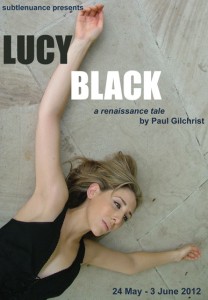Lucy Black | Subtlenuance at The Tap Gallery
- June 5th, 2012
- Posted in Reviews & Responses
- Write comment

Subtlenuance is a company that is the epitome of DYI. With a vision after my own heart, Paul Gilchrist and Daniela Giorgi, time and time again put their money where their heart/mouth/writing is and self-produce exclusively new Australian works. They produce each others plays and invite talented and enthusiastic people to leap on board. Last year most notably they opened their program to a collection of short one-person shows under the banner “Bare Boards Brave Heart”, and produced Katie Pollock’s “A Quiet Night In Rangoon.” Their work ethic is astounding – and if the mantra for academics is “publish or perish” Subtlenuance would be “produce or perish.”
It’s no secret that this company is run on enthusiasm and the smell of freedom. They tour, they write, they produce, they provide opportunities for actors to cut their teeth – or sharpen them – on the wildly rewarding challenge of new plays.
It was a severe arm bend moment from my colleague at The Arts Platform to attend opening night of Paul Gilchrist’s LUCY BLACK- only because I had been writing grants and corporate plans all day and had as much foyer charisma as a lost dried fig.
The play is set in a imagined Rennaisance world and follows the story of an unofficial medial apprentice, Lucy Black (Corinne Marie), whose intuitive healing and medical interests have been handed down from her recently deceased father. An unknown illness sweeps through the town and the world is in disarray. Soon an ambitious butcher (Richard Hilliar) who aims to other throw the current monarch with the assistance of his wife (Sonya Kerr), a herbal physician and Lucy Black.
The play is presented in a series of tight duets or trios – subtextual battles between ideologies and experience reign supreme and manipulation and strategy runs high: whether it be in the pursuit of love, sex, marriage, dissection, power, authority. Though the plot is a little simplistic – this is not a play which is necessarily about action – but ideas. It is a post apolcalyptic portrait, re-imagined and is not an uncommon interest of Australian writers – I reference Ron Elisha’s ‘Rennaisance’ (Winner of the 2005 Mitch Mathew Award, Parnassus’ Den – produced at The Old Fitz in 2006), and even a touch of Ari Lander’s Redemption (developed under Timothy Daly, produced at The Old Fitz in 2009) or even Paul Gilchrist’s ‘Catherine at Avignon’ (Produced in 2009). Internationally the play could perhaps sit alongside (as I suggested to Mr Blake at opening night David Harrowers’ Knives in Hens, or perhaps Alan Bowne’s Beirut or perhaps Silence by Moira Buffini.
The interesting and difficult terrain is then the language. Gilchrist presented a bold mash up – a collision between quaint middle English and Australian vernacular. The effect is startling and jarring – and mirrors the ideas in the play: a collision between old and new medical practice, political guard, sexual roles of women. The language itself is a indication of how unsettling new ideas, new horizons can be. This is a new experiment in style – and sometimes it works – and sometimes it doesn’t – but the effect is fascinating and forces your ear to tune between the language styles.
Admirably – the actors in this piece Richard Hilliar, Sonya Kerr, Corinne Marie, Joshua Morton, Zara Zoe deliver the lines with unflinching intent and confidence. They are well cast, well placed and their conviction and emotional force wins us over. Though, in some sections some subtextual currents were played too broadly and boldly, for my taste – withholding intent and emotion can be a powerful and fixating tool to pry open the audience.
Though now closed, I wanted to note this production as an example of brave experiment and unwaivering conviction from all involved.
And a good note too. Hats off to Paul and Dani for their remarkable and inspiring commitment to their vision and quality of work.